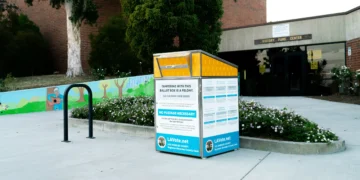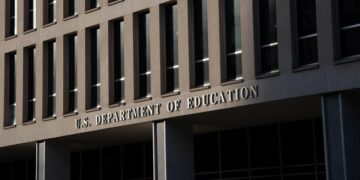The consequences of President Joe Biden’s border policies are being felt far beyond the southern border, turning every state into a border state. The surge in illegal immigration, exacerbated by the administration’s lax enforcement and reversal of previous deterrent policies, is straining resources and communities nationwide. This influx has brought significant challenges, as illustrated by the crisis in Whitewater, Wisconsin.
Under President Biden, there has been a dramatic shift in immigration policy. The administration has rolled back many of the enforcement measures implemented by the Trump administration, including the “Remain in Mexico” policy and the construction of the border wall. Biden went so far, he auctioned of parts of the border wall. These changes have led to an unprecedented increase in illegal crossings. According to U.S. Customs and Border Protection, encounters at the southern border surpassed two million in 2022, the highest number ever recorded.
This surge is not confined to the border states. Towns and cities across the United States are experiencing the repercussions. Eric Hovde, a Republican candidate for the U.S. Senate, highlighted a striking example during a recent radio show: “I’ll give you an example. Whitewater, WI. It’s a town of about 13,000 citizens. They dropped 1,000 illegal immigrants overnight there.” The sudden arrival of such a large number of individuals in a small town creates immediate and overwhelming pressure on local resources and infrastructure.
The challenges faced by Whitewater are part of a broader national issue. Small towns and cities are unprepared for such a rapid influx of people who require housing, healthcare, education, and employment. These communities often lack the necessary infrastructure and funding to accommodate and integrate large groups of new residents, leading to overburdened schools, strained healthcare facilities, and increased competition for jobs.
Furthermore, the economic impact cannot be overlooked especially in our high inflationary economy. Illegal immigration can depress wages and job opportunities for American citizens, particularly in low-skilled sectors. It also places a financial burden on taxpayers, who are responsible for funding public services and welfare programs used by undocumented immigrants. The strain on public resources can lead to higher taxes and reduced quality of services for all residents.
In addition to the economic concerns, there are security implications. The lack of enforcement at the border allows individuals with potentially dangerous backgrounds to enter the country unchecked. Communities already struggling with crime and poverty are particularly vulnerable to these risks. We see this playing out in Chicago, New York and other urban centers that have high rates of crime outside of illegal immigration.
The situation in Whitewater, Wisconsin, serves as a stark reminder that we are all border states now, grappling with the consequences of an uncontrolled and poorly managed immigration system. Every state is now dealing with the consequences of these policies, whether it is through increased crime, economic strain, or overburdened public services.
To address these challenges, it is crucial to enforce stricter immigration policies that protect the interests and safety of American citizens. This includes securing the border with policies like the Remain in Mexico policy, reinstating effective deterrent measures regarding phony asylum claims, and ensuring that immigration laws are enforced uniformly across the country. We had these policies under President Trump, Biden repealed them. Without these steps, the burden of illegal immigration will continue to fall disproportionately on communities least equipped to handle it.































